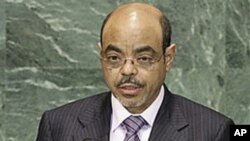Ethiopia's Prime Minister Meles Zenawi has blasted the recent European Union report on last May's elections, calling it "trash".
Speaking to Ethiopian journalists, Prime Minister Meles described the EU Election Observer Mission report as "useless trash that deserves to be thrown in the garbage". He is quoted as saying the report was not about Ethiopia's election, but was "just the view of some Western neo-liberals who are not happy about the strength of the ruling party".
The comments were broadcast on Ethiopia's state-run television.
The final EU report, released in Brussels last week, criticized the conduct of the May 23 elections on several fronts. Among other things, it charged that state resources had been used in the ruling party's campaign and that, in a significant number of polling stations, final vote counts were different from those recorded by observers.
In a telephone interview, observer mission chief Thijs Berman defended his conclusions and rejected the prime minister's criticisms.
"One-hundred and seventy independent observers have been working here in Ethiopia to assess the electoral process in a very serious and professional way," Berman says, "Anyone who tries to show contempt for this professional work shows contempt for himself. It is degrading for the prime minister to react this way."
Berman notes that European Union foreign policy chief Catherine Ashton has praised the quality of the report and promises to engage the Ethiopian government on its findings. He says questions raised about vote tampering warrant further examination.
"If we say 27 percent of the results in the cases we observed had changed between the polling station and the final aggregation, then this is something that warrants a serious investigation about what went wrong and is this something that can be corroborated by other investigations in the rest of the country," Berman adds.
Tensions about the EU mission have been building, even before the election. The government had laid down strict rules for conduct of the observers, arguing that a previous EU mission observing the disputed 2005 election had violated its mandate.
The government has also criticized the long delay between the May 23 election and the release of the final mission report.
But Berman tells VOA the report was ready months ago. He says the release was delayed and the report eventually released in Brussels after it became clear he would not be allowed to present it officially to Prime Minister Meles.
"In more than 80 missions in more than 50 countries, it has never happened that the inviting government refuses the presentation of the final report before the first, who are entitled to get this information, namely the Ethiopian citizens. Which is bad for the long-term future of Ethiopia because real stability can only be brought about by improving the democracy in Ethiopia," he said.
The election almost completely wiped out Ethiopia's fledgling opposition. The ruling Ethiopian People's Revolutionary Democratic Front won all but two of the 547 seats in parliament, prompting charges the country has become a one-party state.
Prime Minister Meles rejects the "one-party" label, instead calling Ethiopia a "dominant party state".
None of the major American democracy groups observed the vote. The Carter Center, which observed the disputed 2005 election, was invited to send a team, but declined the invitation.




